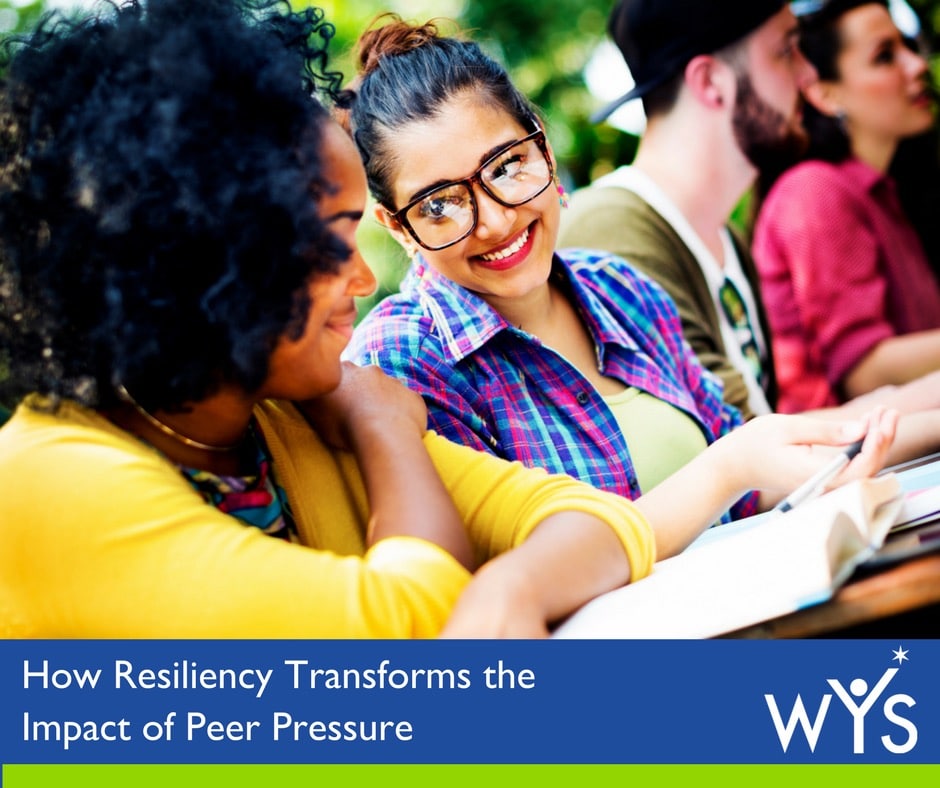
How Resiliency Transforms the Impact of Peer Pressure
Friends and peers are an important part of growing up and can bring positive influence and important and supportive relationships into a child’s life. On the flip-side there is peer pressure which can open the door to bullying, cyber-bullying, shame, self-doubt, negative body image, self-harm and even suicide.
A research study by the National Institute of Health states that children are most vulnerable to peer pressure between the ages of 10 and 14. Resistance to peer pressure increases up to the age of 18 and then typically holds steady. According to the study, this pattern is consistent for both girls and boys and across all ethnic and socioeconomic groups.
In our experience, the children that we work with that are affected by peer pressure often have unresolved adverse childhood experiences or ACEs. Once we are able to identify the root cause of the challenges they are facing, we work with them and often their family members to teach them coping skills and tools for how to handle difficult situations. We show them that they are not alone and inform them on how to reach out for help. This combination of new skills and information can help to build their self-confidence and self-compassion which strengthens their resiliency and leaves them better equipped to handle the stress and anxiety related to peer pressure, shame, bullying, and other negative situations that might arise.
What Peer Pressure Looks Like

Peer pressure is the influence that individuals within the same age group or social circle project onto one another. This turmoil can be happening quietly and even remotely, through social media or online video games. Often, it is actually the pressure to feel perfect or to perform in a way that is out of alignment with one’s true wants, desires or values that sets off feelings of low self-esteem and self-worth.
Although peer pressure shows up in many ways, the overriding emotion that comes with it is shame. These incidents can trigger feelings of inadequacy, unworthiness, unhappiness, and instability. The scariest part is that children often become masters at hiding their feelings. Without a parent or guardian even knowing what they are experiencing, they can feel abandoned and alone, while help is only a conversation away.
The controversial Netflix series 13 Reasons Why is a case study in the effects of peer pressure. Some of the topics graphically covered throughout the episodes are: abandonment, abuse, anxiety and depression, bullying and cyber-bullying, drug and alcohol abuse, eating disorders and negative body image, embarrassment and shame, family dysfunction, social isolation and withdrawal, learning disabilities, neglect, self-harm and suicide. Our article 13 Reasons Why We MUST Talk About Teen Mental Health covers these topics in greater detail.
Regardless of the reason, shame is devastating to the sense of self and is an overwhelming and dangerous emotion. You may ask, what can be done to help? Can shame and the feelings associated with it be overcome? Can self-esteem and self-compassion be claimed? Yes!
Winning the Battle Between Adversity and Resiliency
Peer pressure and the related actions and emotions is a form of adversity. The way to foster self-acceptance and worthiness is to build resiliency. The battle between adversity and resiliency is ongoing. Growing a resilient mindset with easy to implement exercises and strategies for children, adolescents, and adults can reverse the affects of adverse events and better prepare us for the twists and turns of life.
Helping children to understand their own value is a crucial element. Every positive experience with a caring adult combats adversity and builds resilience which creates an opportunity for children and young adults to thrive. Parents, guardians, and other caring adults can encourage open conversations that build mutual trust and respect. This can become the framework for how they allow others to treat them. Self-confidence grows when a child feels heard, respected and that they matter.
Those who know how to effectively identify and communicate their feelings tend to have stronger boundaries around peer influences that otherwise may lead them to slack in school, turn to drugs or alcohol, or exhibit other risky behavior.
The bottom line is that children experience peer pressure and often traumatic events that might not seem like a big deal to adults, but can be life-changing for them. As adults in their lives we must be informed and keep a watchful eye on the next generation. We must do all we can to protect them and empower them with the tools they need to grow into happy and healthy adults. This is what we do at WYS, please join us…







